MercoPress. South Atlantic News Agency
Tag: Argentine peso
-
Friday, October 5th 2018 - 08:36 UTC
Argentine Peso slips on Thursday on prospects of higher US interest rates
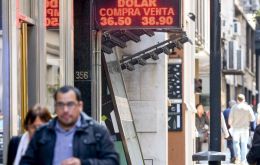
Argentina’s Peso fell on Thursday, pressured by the recession-hit country’s dismal inflation outlook and higher U.S. interest rates that have pushed capital away from riskier emerging markets and toward the greenback, local traders said. The peso shed 1.85% to close at 38.4 per dollar after having gained 9.58% over the previous three days under a freshly-renegotiated International Monetary Fund financing deal that calls for tougher fiscal and monetary policy measures.
-
Thursday, October 4th 2018 - 08:24 UTC
Argentine Peso strengthens for third day running supported by high interest rate for short term debt
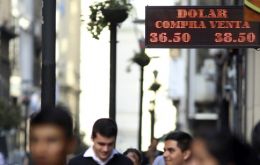
Argentina’s peso rallied for a third straight day on Wednesday, after high-interest short-term debt issued by the central bank soaked up liquidity, a strategy that has raised concern about the sustainability of the country’s program.
-
Tuesday, October 2nd 2018 - 08:21 UTC
Argentine Peso rises 4% after central bank sells seven-day notes paying 72%
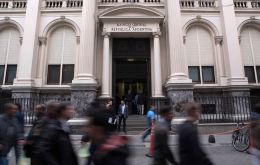
The he Argentine peso climbed more than 4% on Monday trading on the back of a debt sale by the central bank aimed at mopping up excess liquidity and signs that the International Monetary Fund (IMF) is solidly behind the administration of president Mauricio Macri.
-
Monday, October 1st 2018 - 08:56 UTC
Beijing currency swap support for Argentina
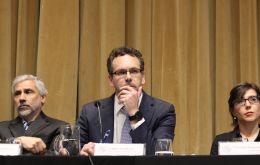
Argentina has “nearly closed” a new currency swap deal with China that will add the equivalent of US$ 9 billion to the South American country’s reserves, the central bank said on Sunday. Argentina and China first agreed to a swap program in 2009 to boost the South American country’s dwindling reserves under former President Cristina Fernandez. Last year, the center-right government of President Mauricio Macri and China agreed to extend the program for three more years.
-
Friday, September 28th 2018 - 08:58 UTC
Brazilian currency strengthens below 4 to the dollar: first time in five weeks
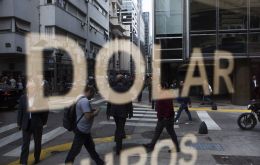
The Brazilian currency dipped under four Real to the dollar for the first time in five weeks at close on Thursday as the markets reacted favorably to the emergence of two clear presidential election frontrunners. The Real closed at 3.99 to the US dollar just two weeks after hitting a record low of almost 4.2 to the dollar -- it's lost around 17% since the start of the year.
-
Thursday, September 27th 2018 - 09:19 UTC
Argentine Peso with trading band and zero growth monetary supply policy
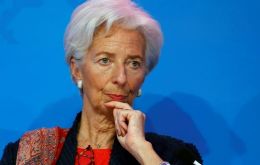
The International Monetary Fund Managing Director Christine Lagarde, speaking at a news conference in New York alongside Argentine Economy Minister Nicolas Dujovne, said IMF was “significantly frontloading” disbursements under the program adding the Argentine central bank had agreed as part of the deal to allow the peso currency to float freely and would only intervene in the foreign exchange market in extreme circumstances.
-
Friday, September 21st 2018 - 09:32 UTC
Argentine Peso recovers strongly and with no support from the Central bank
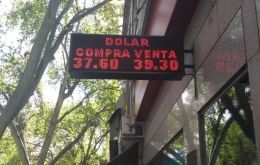
The Argentine Peso reacted strongly against the US dollar on Thursday following on an abundant private supply of greenbacks to satisfy demand, which kept the Central Bank out of the market for the first time since the beginning of the month. The dollar fell 2.8% and ended trading below 39 Pesos.
-
Friday, September 21st 2018 - 08:47 UTC
Argentine Peso at an equilibrium point, says head of Central bank

Argentina’s central bank now sees the Peso at an equilibrium level, chief Luis Caputo told market participants who attended a meeting with him on Thursday. The statement comes after two days of strengthening by the peso following a rout that sent it to a record intra-day low in late August.
-
Tuesday, September 18th 2018 - 06:56 UTC
Argentine Peso recovers on an IMF support message and budget presentation to Congress
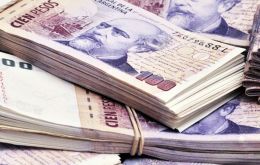
Argentina's battered Peso currency inched higher and the risk of its bonds defaulting declined after the government unveiled its budget plan and the IMF said “important progress” had been made on revamping the country's standby loan agreement.
-
Monday, September 17th 2018 - 08:12 UTC
International support for Argentina's general strike against IMF austerity measures
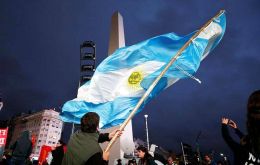
The International Trade Union Conference, ITUC’s affiliates in Argentina, CGT, CTA-A and CTA-T have announced a general strike for 24-25 September in opposition to expected sweeping austerity measures being developed by the government and the International Monetary Fund.
